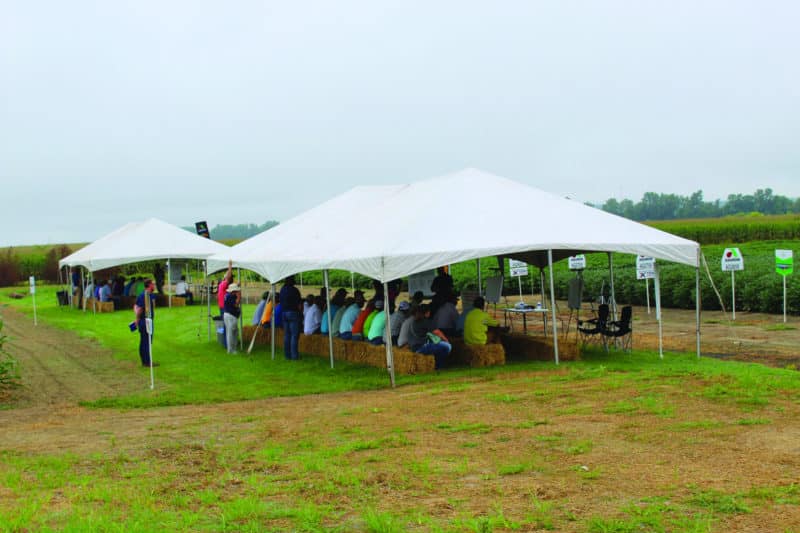With one swipe or click, nearly all the latest information in seed and herbicide technologies is accessible through a mobile phone or laptop screen. In tandem with those virtual tools, companies like Bayer Crop Science remain committed to offering farmers valuable in-person opportunities to experience the newest products in the field too.
In August, more than 400 attendees flocked to the 21st Annual AgKnowledge Field Day at Bayer’s Union City, Tennessee research facility where new corn, soybean and cotton genetics were showcased along with newly launched and upcoming technologies in herbicide and seed offerings, says Larry Ganann, technical agronomist with Bayer.
“We feel it’s important to invest in these kinds of face-to-face meetings because this a good way to connect with our customers who still like to see the technology up close, put their hands on the products and be able to have their questions answered by a Bayer rep or an Extension specialist,” Ganann says.
In addition to farmers, industry representatives, especially those from Bayer’s retail base in the mid-south, attend the field day. Ganann says it’s their chance to see what’s coming down the pipeline in terms of germplasm and to gain insights about stewardship practices for new technologies in the herbicide and insecticide realms.
“Attendees have a chance to hear directly from the Bayer Crop Science scientists who’ve developed these products on how to use them effectively so we can keep these important tools durable and viable for as long as possible,” Ganann says. “University researchers also present under the tents alongside the Bayer representatives for a true agronomic look at new technologies and best management practices.”
Among those new products heralded at the 2019 event were a new cotton insect trait that targets cotton pests and a more robust herbicide trait package in XtendFlex® soybeans. The new cotton insect trait coming through the pipeline will help protect the crop from tarnished plant bug and cotton thrips.
“Controlling cotton thrips early on and then providing some protection against tarnished plant bugs at the midpoint of the growing season is really crucial for cotton growers,” Ganann says.
XtendFlex soybeans — tolerant to glyphosate, glufosinate and dicamba — will represent Bayer’s first triple-stack soybean trait once commercialized. The seed genetics carrying this new technology to market were on display at the field day.
“We’re excited about this technology because growers need as many herbicide options as possible. In this region, Palmer amaranth pigweed gives us the most trouble in soybean and cotton production,” Ganann notes.
Speaking of weeds, discussing weed management practices has been a hallmark of the field day event for the last two decades. Bayer and university extension staff are on hand to give their expert advice on the topic.
“We continue to stress and recommend that while Bayer is providing some over the top solutions for weed control, it’s critical that growers continue to use a pre-emergence herbicide and introduce multiple modes of action in problem fields if they want the best chance to control weed populations across species,” Ganann notes.
The Ideal Field Day Formula
As organizer of the AgKnowledge Field Day for the past decade, Ganann says he’s learned that offering quality content keeps the crowd coming year after year. A great lunch helps too.
“The technology and genetics have to be there on display, you have to have good food and you have to have a good venue,” he says.
Giving attendees a chance to connect and share their perspectives is important too.
“There’s a networking aspect to this kind of event. Farmers enjoy sitting next to each on those bales under a tent and swapping stories about each other’s experiences — what they saw happen on their farm, what worked and what did not work,” Ganann says.










